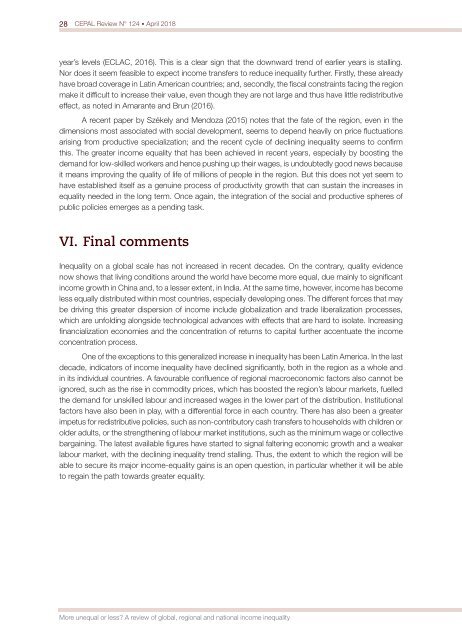CEPAL Review no. 124
April 2018
April 2018
You also want an ePaper? Increase the reach of your titles
YUMPU automatically turns print PDFs into web optimized ePapers that Google loves.
28 <strong>CEPAL</strong> <strong>Review</strong> N° <strong>124</strong> • April 2018<br />
year’s levels (ECLAC, 2016). This is a clear sign that the downward trend of earlier years is stalling.<br />
Nor does it seem feasible to expect income transfers to reduce inequality further. Firstly, these already<br />
have broad coverage in Latin American countries; and, secondly, the fiscal constraints facing the region<br />
make it difficult to increase their value, even though they are <strong>no</strong>t large and thus have little redistributive<br />
effect, as <strong>no</strong>ted in Amarante and Brun (2016).<br />
A recent paper by Székely and Mendoza (2015) <strong>no</strong>tes that the fate of the region, even in the<br />
dimensions most associated with social development, seems to depend heavily on price fluctuations<br />
arising from productive specialization; and the recent cycle of declining inequality seems to confirm<br />
this. The greater income equality that has been achieved in recent years, especially by boosting the<br />
demand for low-skilled workers and hence pushing up their wages, is undoubtedly good news because<br />
it means improving the quality of life of millions of people in the region. But this does <strong>no</strong>t yet seem to<br />
have established itself as a genuine process of productivity growth that can sustain the increases in<br />
equality needed in the long term. Once again, the integration of the social and productive spheres of<br />
public policies emerges as a pending task.<br />
VI. Final comments<br />
Inequality on a global scale has <strong>no</strong>t increased in recent decades. On the contrary, quality evidence<br />
<strong>no</strong>w shows that living conditions around the world have become more equal, due mainly to significant<br />
income growth in China and, to a lesser extent, in India. At the same time, however, income has become<br />
less equally distributed within most countries, especially developing ones. The different forces that may<br />
be driving this greater dispersion of income include globalization and trade liberalization processes,<br />
which are unfolding alongside tech<strong>no</strong>logical advances with effects that are hard to isolate. Increasing<br />
financialization eco<strong>no</strong>mies and the concentration of returns to capital further accentuate the income<br />
concentration process.<br />
One of the exceptions to this generalized increase in inequality has been Latin America. In the last<br />
decade, indicators of income inequality have declined significantly, both in the region as a whole and<br />
in its individual countries. A favourable confluence of regional macroeco<strong>no</strong>mic factors also can<strong>no</strong>t be<br />
ig<strong>no</strong>red, such as the rise in commodity prices, which has boosted the region’s labour markets, fuelled<br />
the demand for unskilled labour and increased wages in the lower part of the distribution. Institutional<br />
factors have also been in play, with a differential force in each country. There has also been a greater<br />
impetus for redistributive policies, such as <strong>no</strong>n-contributory cash transfers to households with children or<br />
older adults, or the strengthening of labour market institutions, such as the minimum wage or collective<br />
bargaining. The latest available figures have started to signal faltering eco<strong>no</strong>mic growth and a weaker<br />
labour market, with the declining inequality trend stalling. Thus, the extent to which the region will be<br />
able to secure its major income-equality gains is an open question, in particular whether it will be able<br />
to regain the path towards greater equality.<br />
More unequal or less? A review of global, regional and national income inequality


















